13th Week of Pregnancy
Sharing Your Big News
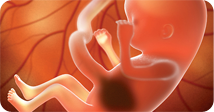
By your 13th week of pregnancy, your baby's organs, nerves, and muscles have formed and are beginning to work together. It's time to focus on growth!
- This week, your baby is about the length of a plum.
- Eyes and ears are clearly defined. Your baby's eyelids are fused together to protect her still-developing eyes.
- Tissue, which will harden into bone, is developing in your baby's head, arms, and legs. Tiny ribs might be visible.
- She’s already on the move! Your baby might be moving her body in jerky motions as she flexes her arms and kicks her legs, but you won't feel her move for at least several more weeks.
- Vocal chords develop.
- Your baby’s circulatory system helps clear toxins from her body.
- When you’re 13 weeks pregnant, your baby's head probably is about half the size of her body.

Your Changing Body When You're 13 Weeks Pregnant
By your 13th week of pregnancy, you are nearing the point when early symptoms of pregnancy should begin to subside. Possible discomforts of late pregnancy are well in the future. This is a great time to enjoy your pregnancy!
- At 13 weeks pregnant, you might feel, like many women, that you can relax more because the risk of miscarriage goes down greatly by this point.
- The changes in your body might become more obvious to others.
- The top of your uterus, called the fundus, now is expanding beyond your pelvis.
- Hormones released by your placenta, ovaries, adrenal glands, and pituitary gland guide the growth of your baby as well as changes within the organs in your own body.
- By your 13th week of pregnancy, your blood pressure drops as yourcirculatory system quickly expands. This may continue through the 24th week of pregnancy before returning to pre-pregnancy levels.
- Your blood supply increases, but most of it is plasma, or the fluid of your blood. Red blood cells, which take longer to develop, catch up around the 20th week of pregnancy.
- Short of breath? You might notice that you're breathing a little faster or have shortness of breath. This is normal. Why? Your body reduces the carbon dioxide level in your blood in order to carry more carbon dioxide from your baby. Your breathing volume and rate adjust to this change, leaving you slightly short of breath.

Wellness and Nutrition at 13 Weeks Pregnant
By your 13th week of pregnancy, you might begin to truly feel pregnant, possibly for the first time. This might be especially true if you're growing out of your normal clothes.
Your next doctor visit. You may have another prenatal doctor visit during the 13th week of pregnancy or very soon after. From this point until you are about 28 weeks pregnant, most of your doctor appointments will follow a routine.
Your doctor monitors:
- Your weight and blood pressure
- Your urine (to check for proteins and sugars)
- Your baby's growth (by measuring the size of your uterus)
- Signs of swelling in your face, ankles, hands, or feet
- You might be hearing your baby's heartbeat for the first time during this visit! This is often possible after the 12th week of pregnancy.
- If you haven't decided about prenatal testing, now is a good time to discuss the options with your doctor.
- CVS (Chorionic villus sampling) is one test that detects chromosome and other genetic abnormalities, usually between the 9th and 14th weeks of pregnancy. Learn more about prenatal screening and diagnostic testing. Link to week 15
- Remember to bring your list of questions or concerns to each visit. If you have immediate concerns, discuss them with your doctor right away.
Wondering When to Tell Your Big News at Work?
If you work, consider these tips for sharing your pregnancy at work:
- Tell your boss personally before she hears from someone else! If you have morning sickness and feel tired while at work, you might want to tell sooner.
- Timing is everything! If you have an upcoming salary review or are in the middle of a key project, you might want to wait until afterward to share your news.
- Offer solutions for handling your workload while you're out. After all, you know your job better than anyone else.
- Get all the details now about maternity leave and policies at your workplace so you're prepared.
14th Week of Pregnancy
Sex During Pregnancy

Baby's Growth and Development at 14 Weeks Pregnant
While many areas of your baby's body are becoming further refined during the 14th week of pregnancy, much of the development this week focuses on your baby's small reproductive system:
- When you’re 14 weeks pregnant, your baby is about the length of your clenched fist.
- In boys, the prostate gland is forming. In girls, ovaries are moving into her pelvis from her abdomen area.
- Your baby's thyroid gland now is working and making hormones.
- By your 14th week of pregnancy, your baby's palate, or the roof of his mouth, has completely formed.
- Your baby already might be or soon will begin growing body hair, called lanugo, which will temporarily keep your baby warm until his baby fat accumulates.
- His head will grow to four times its current size and increase 60 times in volume by the time of his birth.

Your Changing Body at 14 Weeks Pregnant
With an increase of hormones in the 14th week of pregnancy and in the weeks that follow, you might notice new changes in your body.
At 14 weeks pregnant, you might see an increase in vaginal discharge, which is normal. Hormones stimulate this, possibly as your body's way of preventing the growth of harmful bacteria.
- Sometimes this surge of hormones can leave your vaginal area out of balance, which can lead to infection. This is common and something your doctor can easily treat.
- If you have any concerns about changes in your discharge or you experience soreness, itching, or bleeding, contact your doctor.
Your Body and Sex During the 14th Week of Pregnancy
- Your desire for sex might be greater or less than normal right now. Both responses are normal.
- Your feelings toward sex might be influenced by how you feel about your body.
- If you are concerned about harm to your baby during sexual activity, remember that your baby is well protected and separated from germs in your uterus. He also is cushioned by amniotic fluid.
- Growth of new blood vessels in the pelvic area might increase sexual arousal.
Pregnancy Changes That Are Skin Deep
- At 14 weeks pregnant, the darkening of skin around your nipples is probably noticeable.
- Like most pregnant women, you also might soon notice a dark vertical line (linea nigra) extending from your navel to pubic area.
- By your 14th week of pregnancy, skin around your navel, armpits, or inner thighs might darken, particularly if you already have a darker complexion.
- Usually this increased pigmentation, driven by increases in hormones, fades after your baby’s birth.
- You also might note a very mild darkening of skin on the forehead, temples, cheeks, chin, and nose (sometimes called the "mask of pregnancy"). This affects about half of all pregnant women and usually fades after your baby is born.

Wellness and Nutrition at 14 Weeks Pregnant
At 14 weeks pregnant, think about making plans for you and baby in the months ahead.
15th Week of Pregnancy
The Purpose of Prenatal Testing
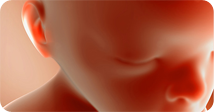
Baby's Growth and Development at 15 Weeks Pregnant
Your baby's internal and external growth continue at a remarkable pace throughout the 15th week of pregnancy.
- When you’re 15 weeks pregnant, your baby is about 4½ inches from head to rump, and weighs about 2 to 3 ounces. She’s about the length of a large apple.
- Your baby's hair might appear on her scalp and eyebrows. Hair follicles even begin to generate the pigments that give hair its color.
- By your 15th week of pregnancy, your baby's ears probably have reached their permanent position on the side of her head, and her eyes are moving to where they belong on the front of her face.
- Your baby's skin is developing, but remains extremely thin.
- Your baby's skeletal system and muscles further develop and strengthen.
- By the end of your 15th week of pregnancy, your baby might be able to wiggle fingers and toes, make a fist, or even suck her thumb!
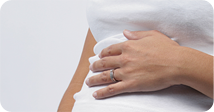
Your Changing Body at 15 Weeks Pregnant
By your 15th week of pregnancy, your body has made major adjustments to nurture your growing baby inside. Starting at about 15 weeks pregnant, your body's next challenge is to make room for your growing baby.
- Your lung capacity increases, allowing your body to carry more oxygen to your baby.
- Your rib cage might enlarge — up to 2 to 3 inches around — to accommodate the increasing size of your lungs!
Hello, Heartburn!
- At 15 weeks pregnant, if you have heartburn — that burning or sour sensation in the back of your lower throat — you’re not alone.
- Heartburn begins when muscles (that are more relaxed than normal due to increased hormones) allow digestive acids to back up into and irritate your esophagus, which connects your throat to your stomach.
- The bad news? Unlike some pregnancy symptoms, this one might continue throughout your pregnancy!
- The good news? With a little care and guidance from your doctor, you often can find relief from heartburn irritation.
Hints for Heartburn
- Watch what you eat, and don't give up the balanced nutrition your body needs.
- Eat smaller, more frequent meals.
- Eat slowly.
- Avoid eating late at night and don't lie down for several hours after eating.
- Ask your doctor about antacids that are okay to take during pregnancy.
Heartburn and Hair — It Is Related!
- Chances are you've heard the old wives' tale: The more heartburn you have throughout pregnancy, the more likely your baby will be born with a full head of hair.
- Actually, recent research turns this tale into truth!
- The specific hormones that are causing your heartburn are the same ones that prompt fetal hair to develop.

Wellness and Nutrition at 15 Weeks Pregnant
By your 15th week of pregnancy, you’ve accomplished a lot. Whether it has been smooth sailing or a bumpy road, it’s not unusual to have concerns or occasional worries about your baby's health.
Prenatal Testing: Knowledge Is Power.
- The more you and your doctor know about your baby's health, the better equipped you can be to address any potential problems.
- You might want to know specifics about your baby's health before she is born, particularly if you have any increased risk factors.
- Prenatal tests include screening tests, which your doctor can describe for you, and diagnostic tests, which are done when a screening test indicates the doctor needs more information.
- Many women choose to have ultrasounds, blood tests, or other tests for a variety of reasons. You and your doctor should discuss which tests you need.
- When examining prenatal testing options, you may want to ask yourself:
- What will you do with the information?
- Will the information help your doctor better care for you and your baby?
- How accurate are the results?
- What are the risks?
- Triple test is a screening test that checks for chromosomal disorders, such as Down syndrome, and spinal abnormalities, such as spina bifida, by measuring:
- AFP (alpha-fetoprotein - Produced by your baby's liver, this protein might show up in your blood.)
- HCG (human chorionic gonadotropin - A hormone produced by your placenta)
- Estriol (An estrogen produced by your baby and your placenta)
- This test is most accurate when completed between the 16th and 18th weeks of pregnancy.
Nutrition Now
Good nutrition now can help protect your baby after birth from diseases. It's yet another reason to eat well!
Your Fit Tip
As your body shape begins to change, so should your exercise routine. By your 15th week of pregnancy, you might need to make changes to stay safe, balanced, and comfortable while working out.
16th Week of Pregnancy
Baby's First Hiccups Ahead!
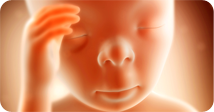
Baby's Growth and Development at 16 Weeks Pregnant
Baby's Growth and Development at 16 Weeks Pregnant
- Right now, your baby is about 4½ to 5½ inches long, or about the length of a large orange.
- Little hiccups continue and you might feel them!
- When you’re around 17 weeks pregnant, a necessary fat called brown fat develops under your baby’s skin. This will help keep her warm after birth. Later in your pregnancy, additional layers of fat develop.
- Air passages in your baby’s lungs finish branching.
- By your 17th week of pregnancy, your baby’s lungs prepare to take in oxygen.
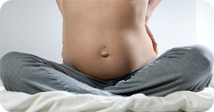
Your Changing Body at 16 Weeks Pregnant
By your 16th week of pregnancy, hopefully, you are finding the recent changes in your body much easier than the first few months of pregnancy.
- Forgetting something? It's normal during pregnancy to become forgetful, even if it's not usual for you. It will pass.
- By your 16th week of pregnancy, your body's bones, joints, and muscles have probably adapted to the extra stress of carrying a baby.
- As you begin to “show,” your navel may protrude.
- At 16 weeks pregnant, pressure from your uterus on the veins that return blood from your legs may lead to leg cramps, especially at night.

Wellness and Nutrition at 16 Weeks Pregnant
In addition to your healthy diet and exercise program, by your 16th week of pregnancy, you might want to address common symptoms of pregnancy during the second trimester.
- Get your iron on! Iron is especially important during these weeks of pregnancy to produce the red blood cells your body needs. Without enough iron, you may become anemic. This can make you tired and more susceptible to illnesses.
- Avoid the nosebleed section. Interested in caring for congestion, stopping the stuffiness, or even nixing the nosebleeds? By your 16th week of pregnancy, you might have found that a runny nose is a usual part of being pregnant. If you're lucky, you may not have had any stuffiness at all. Either is normal, but if hormones and your body's extra blood volume wreak havoc with your nose, take a look at these suggestions:
- Try saline drops (with your doctor's approval).
- Drink enough liquids to keep nasal passages moist.
- Try a humidifier, particularly when you sleep.
- Dab petroleum jelly around the edges of your nostrils to further moisten and protect the skin.
Fit Tip
Replace any fluids you lose when you sweat during exercise. For every half hour of exercise or vigorous activity, be sure to add an extra glass of water or liquid to your daily total.
Healthy Eating Reminders
Increase your intake of:
- Whole grains
- Fruits and vegetables
- Low-fat, nutrient-rich proteins
- Unsaturated fats
Decrease:
- Saturated and trans fats
- Sweetened beverages and other refined sugars
17th Week of Pregnancy
Necessary Nutrients

Baby's Growth and Development at 17 Weeks Pregnant
Between the 17th week of pregnancy and the 20th week, your baby experiences growth changes.
- Right now, your baby is about 4½ to 5½ inches long, or about the length of a large orange.
- Little hiccups continue and you might feel them!
- When you’re around 17 weeks pregnant, a necessary fat called brown fat develops under your baby’s skin. This will help keep her warm after birth. Later in your pregnancy, additional layers of fat develop.
- Air passages in your baby’s lungs finish branching.
- By your 17th week of pregnancy, your baby’s lungs prepare to take in oxygen.

Your Changing Body at 17 Weeks Pregnant
The good news about the 17th week of pregnancy and beyond is that while your body changes accelerate, early pregnancy symptoms dissipate.
- By your 17th week of pregnancy, your growing placenta reaches one inch in thickness. Your placenta continues to deliver oxygen and nutrients to your baby and to eliminate waste.
- You are gaining about one pound a week between the 16th and 20th weeks of pregnancy.
- When you’re around 17 weeks pregnant, your bones, muscles, and joints begin to change to accommodate your growing body.
- You also might experience backaches, cramps, swollen legs and ankles, and varicose veins.

Wellness and Nutrition at 17 Weeks Pregnant
Necessary nutrients: what your body really needs during pregnancy
As you know, eating a balanced diet with colorful, nutritious foods and taking a prenatal supplement significantly impacts you and your baby’s growth and health.
At 17 weeks pregnant, it's important to continue boosting your diet with some specific nutrients that have been shown to provide unique benefits.
- Calcium: low-fat yogurt, reduced-fat milk, reduced-fat cheese, low-fat cottage cheese, tofu, almonds, broccoli
- Folic acid (folate): orange juice, spinach, asparagus, kale, collard greens, beans, whole-grain breads, fortified whole-grain cereals, wheat germ
- Iron: lean beef, nuts, eggs, soy, fortified whole-grain cereals, oatmeal, leafy greens
- Protein: lean beef, chicken, turkey, pork, beans, tofu, dairy
- Vitamin A: citrus fruits, broccoli, bell peppers, strawberries, tomatoes, mangoes, potatoes with the skin
- Vitamin C: carrots, winter squash, mangoes, sweet potatoes, leafy greens, lean sources of meat, eggs, dairy, fortified whole-grain cereals
- Zinc: lean beef, whole grains, nuts, legumes, seeds, fortified whole-grain breakfast cereals, peas, lean dairy, spinach
Exercise That Counts: The Pelvic Tilt
The pelvic tilt is an exercise that strengthens your stomach muscles. A helpful move for your 17th week of pregnancy and beyond, it might relieve backaches and back pain as well as improve flexibility.
Try It for Yourself
- Get down on your hands and knees.
- Tilt your hips forward.
- Pull in your stomach and gently round your back.
- Hold for five seconds.
- Release gently and relax your back and stomach.
- Try keeping your back flat when you are in the release position.
- Repeat several times.
18th Week of Pregnancy
Do You Hear What I Hear?
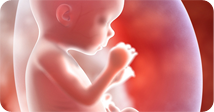
Baby's Growth and Development at 18 Weeks Pregnant
At 18 weeks pregnant, growing is your baby’s number-one priority. Take a look at some of the developmental changes:
- This week, your baby is about 5½ inches long, or about the length of a large tomato.
- Your baby’s skeleton continues to harden during the 18th week of your pregnancy. His leg bones and inner ear bones are the first to ossify (harden).
- Your baby now can hear! He might hear your heart beat or your tummy gurgle.
- He might hear loud sounds outside the womb.

Your Changing Body at 18 Weeks Pregnant
At 18 weeks pregnant, you’ll start to experience some important milestones in your pregnancy.
- You might feel baby start to move — little flutters — as early as the 18th week of pregnancy. This is called quickening. The next time you see your doctor, let him or her know about any fetal movement. He or she might ask you to keep track of your baby’s movements using a kick count chart. It might be early for you and baby yet, so if you’re not feeling flutters, that could be perfectly normal.
- By your 18th week of pregnancy, you are becoming more emotionally attached to your baby. Have you started making a list of baby names?
- Hormonal changes continue, which help your baby grow and impact your digestive and other systems.
- Digestion remains slower and you might experience heartburn or constipation.
- At 18 weeks pregnant, your skin might become blotchy or darken slightly on your face. It also might darken around your nipples or navel. You might have dry skin or itchy skin.
- You might experience difficulty sleeping. Check out body pillows — they’re great for extra comfort while you’re sleeping.

Wellness and Nutrition at 18 Weeks Pregnant
Around the 18th week of pregnancy, you probably are seeing your doctor for another prenatal visit.
- Your doctor will check your weight, blood pressure, urine, and other vitals.
- Your doctor might check your uterus and measure the height of your fundus between the 18th week of pregnancy and the 34th week.
- If you have felt your baby move, let your doctor know when quickening began.
- Knowing when your baby started moving and the frequency of his kicks can help your doctor do two things. Your doctor can better estimate your baby’s fetal age and better estimate your due date.
- Depending on your medical history, age, and other information, your doctor might talk to you about amniocentesis around the 18th week of pregnancy, a test that checks for genetic abnormalities, such as Down syndrome.
19th Week of Pregnancy
New Foods and New Moves

Baby's Growth and Development at 19 Weeks Pregnant
During the weeks before, during, and after your 19th week of pregnancy, your baby’s brain develops at a phenomenal rate. Other systems continue to grow.
- Your baby now measures about 6 inches, or the length of a summer squash.
- When you’re 19 weeks pregnant, your baby’s brain develops millions of motor neurons. Neurons are nerves that help muscles in the brain communicate. This new and ongoing development means your baby can make purposeful and involuntary movements. She can suck her thumb, move her head, or make other moves that you might start to feel.
- Your baby’s hearing is even more developed when you’re 19 weeks pregnant. She probably can hear external sounds and conversation by this time, or will very soon. Your voice is the most pronounced. She can hear you talk, hum, and sing!
- Your baby’s skin is covered in a white, waxy, protective coating called vernix.
- Under the vernix, the fine hair called lanugo continues to cover her skin.
- By your 19th week of pregnancy, your baby’s kidneys function. Her urine is excreted into your amniotic sac, the bag of fluid in your uterus that contains your baby and amniotic fluid. Your placenta then removes the waste.

Your Changing Body at 19 Weeks Pregnant
During your 19th week of pregnancy and the weeks surrounding this time, your body continues to change and adapt to accommodate your baby’s current growth and future needs.
- Your body makes more blood.
- Your circulatory system expands and keeps blood pressure lower than normal. As a result, you might get dizzy, lightheaded, nauseated, or faint if you stand or rise too quickly.
- Around your 19th week of pregnancy, you might experience nasal congestion, nosebleeds, and headaches due to increased blood flow.Learn how to treat nasal issues.
- You also might encounter tender or bleeding gums. Learn about dental care during pregnancy.
- At 19 weeks pregnant, your lung capacity continues to increase. You might breathe faster or experience shortness of breath.
- Your breast cup size increases around your 19th week of pregnancy due to enlarging milk-duct glands and increasing blood flow.

Wellness and Nutrition at 19 Weeks Pregnant
At 19 weeks pregnant, keep nutrition and exercise interesting and fun. Introduce some new foods and new moves.
Fat Is Your Friend
Who knew fat could be a friend during pregnancy? It’s true. Fats are an essential part of your baby’s growth and development around the 19th week of pregnancy. Choosing the right fats is the trick.
Choose:
- Low-fat dairy, lean meats, vegetable oil
- Unsaturated fats found in fish, plant oils (olive, walnut), nuts, legumes, seeds
Avoid:
- Saturated fats found in meat, dairy products, baked goods, processed foods, coconut, butter, lard
- Trans fats found in margarines and processed and manufactured foods, such as cookies, crackers, and chips
- Hydrogenated or partially hydrogenated vegetable oils found in processed foods
Exercise: Keep It Fresh.
Have you tried something new lately? Look into pregnancy classes at your local gym, rec center or Y®. Or consider trying one of these low-impact activities:
- Aerobics
- Bicycling
- Bowling
- Cross-country skiing
- Golfing
- Jogging
- Pilates for pregnant women
- Swimming
- Walking
- Water aerobics
- Water exercises
- Weight training (Use light weights and do not overexert yourself.)
- Yoga for pregnant women
20th Week of Pregnancy
Your Baby Likes to Catnap
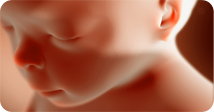
Baby's Growth and Development at 20 Weeks Pregnant
When you’re 20 weeks pregnant, your baby is getting used to all his developing parts. Your baby is moving around and you may be able to feel it. Baby development includes:
- When you’re 20 weeks pregnant, your baby measures about 6”, about the length of an eggplant, and weighs about half a pound.
- Your baby’s skin thickens and develops layers under the vernix during the 20th week of pregnancy.
- His hair and nails continue to grow.
- His limbs are well developed when you’re 20 weeks pregnant.
- Your baby is moving and you can feel it. Make a note of when you felt these movements start and let your doctor know.

Your Changing Body at 20 Weeks Pregnant
Congratulations. You’re officially halfway through your pregnancy! Physical changes in your body continue at 20 weeks pregnant, including:
- As your baby grows, your body adjusts to his size. By your 20th week of pregnancy, organs are beginning to be pushed out of their normal places by your growing uterus, which now reaches your navel.
- Your intestines are the first organs to shift due to your enlarging uterus.
- As your uterus expands and your weight increases, you might experience a change in your center of gravity. Try these tips for managing the shift.
- Your rate of urination may slow. Go often to minimize the risk of a urinary tract infection. Remember, you can lean forward to help completely drain your bladder. Don’t rush!
- Vaginal discharge might slightly increase around your 20th week of pregnancy. Speak with your doctor if you are concerned about vaginal infection. It can be treated during pregnancy.
- As tension increases on muscles and ligaments surrounding your growing uterus, you might experience some aches, particularly in your lower abdomen or back.
- One specific type of pain is called round ligament pain. The round ligament is one of the ligaments that holds your uterus in place. During pregnancy, it stretches and thickens to accommodate your growing uterus.
- If you make a sudden move or reach for something quickly, you might experience round ligament pain, a sharp but temporary cramp in your lower pelvic area. Round ligament pain also can be triggered by exercise.
- Contact your doctor if back pain is particularly severe and does not subside, if it significantly limits your routine, or if cramping continues.
Your Body in Balance!
By your 20th week of pregnancy, your expanding belly and a uterus that now is heavier and higher are working together to change your body's center of gravity.
- You might feel like you're going to fall over at times. This is not unusual.
- You might unconsciously be adjusting your posture and how you walk or move.
- The lower portion of your spine might be beginning to curve backward slightly to help you compensate for your change in gravity. This can lead to additional strain on your back muscles.
- As your increasing uterus and abdomen begin to place more strain on your back muscles, you might want to weave the pelvic tilt into your daily routine.

Wellness and Nutrition at 20 Weeks Pregnant
By your 20th week of pregnancy, you probably have a regular routine of eating well and exercising routinely. See what research says about the benefits of nutrition during pregnancy as well as exercises you can do to prepare for labor and delivery.
- According to research, nutrition in utero and childhood can play a role in your baby’s health in many ways.
Short-term health effects include:
- Brain development
- Growth and body composition
- Metabolic programming
Long-term health effects include:
- Cognitive and educational performance
- Physical strength, immunity
- Risk for diabetes, obesity, heart disease, high blood pressure
- Kegel Exercises: Easing Your Way to Labor and Delivery
Kegels are a simple and discreet exercise that can help strengthen the pelvic floor muscles, including the muscles around your vagina, urethra, and anus. Kegels help stop urine from leaking (like when you sneeze or laugh) and can help prepare you for delivery. Studies show that Kegels also might reduce the chances of an episiotomy during birth.
How To:
You can do Kegels whether you’re sitting, standing, or reclined.
- Squeeze or tense the muscles around your vagina and anus, as if you’re trying to stop the flow of urine. Don’t actually stop the flow, though.
- Hold for 10 seconds and release.
- Repeat 10 to 20 times in a row, a few times throughout the day.
Like any exercise, you can increase both the hold time and repetition as you build stamina.
21st Week of Pregnancy
Class Is In Session

Baby's Growth and Development at 21 Weeks Pregnant
By your 21st week of pregnancy, not only have your baby's important systems developed, but many of them now are operating, in preparation for functioning on their own after birth:
- Your baby might be about 7 inches in length, roughly the length of a carrot, by 21 weeks pregnant. She weighs almost 11 ounces.
- Your baby's digestive system is put to work! By your 21st week of pregnancy, your baby has probably begun swallowing amniotic fluid and absorbing small amounts of sugar from it.
- Sugars pass through her developed digestive system, giving these organs important practice.
- These sugars only make up a tiny part of your baby's nourishment.
- Most of her nutrition still is delivered through your placenta and the umbilical cord.
- Your amniotic fluid changes day to day, based on what you've eaten. Since your baby is swallowing the fluid, she gets a "taste" of what you're eating!
- Your baby’s bone marrow, rather than your baby’s liver and spleen, takes over its permanent job of making blood cells.
- By your 21st week of pregnancy, your baby's arms and legs are in proportion.
- As muscles strengthen and neurons connected to her brain continue to develop, her movements become more coordinated.

Your Changing Body at 21 Weeks Pregnant
As you enter your 21st week of pregnancy, you start the second half of your pregnancy! This week and in those to come, you probably will notice many of the same changes you've experienced in previous weeks.
- Your blood pressure might continue to remain slightly lower than normal. Expect it to return to normal by 25 weeks pregnant.
- As long as you're taking in enough iron, your body makes more blood, including more red blood cells.
- Your breasts may continue to grow larger and are probably already prepared to produce milk at 21 weeks pregnant!
- You even might see tiny drops of watery or yellowish fluid appearing on your nipples, even this early. This is early breast milk, called colostrum.
- Don't worry if your breasts do not leak at any time during pregnancy. That's normal and does not affect whether you are able to breastfeed after your baby's birth.
- Although most women gain a pound a week during this time, you might notice that one week you gain a little more and another week a little less. The key is to keep your weight gain stable, overall.
- Other common symptoms such as lower-back pain and vaginal discharge may continue during your 21st week of pregnancy.

Wellness and Nutrition at 21 Weeks Pregnant
With an active baby growing inside, you might start to focus on the excitement of her birth to come. Continuing to eat right and exercise regularly now can make that big day easier.
- Childbirth preparation class is one of the best ways for you and your partner to prepare for labor and delivery.
- Your doctor can probably suggest classes that are a good match for the kind of birth you want.
- Expectant parents usually take classes between months six and seven of pregnancy.
- Classes often include six to eight weekly sessions or offer more condensed weekend options.
- Trained childbirth educators provide comprehensive, helpful information about labor and delivery that extends well beyond breathing techniques.
- It's an ideal way to learn more and ease any fears or apprehension you might feel.
- Don't forget the iron! With your body hard at work producing red blood cells, your 21st week of pregnancy is a key time to be sure you are getting at least 30 mg of iron each day to avoid the risk of anemia.
- Healthy teeth and gums: tips you can sink your teeth into!
- This is one of the best times to keep a focus on your dental health. Don't let sensitive, even bleeding gums keep you from brushing, flossing, and caring for your teeth.
- Switch to a softer toothbrush and keep regular dentist visits — just let them know you are pregnant.
- You are more susceptible to gingivitis while pregnant, so be consistent with flossing.
- Choose toothpaste with fluoride and avoid sugary snacks at times when you can't brush between meals. Your teeth and your post-pregnancy waistline both thank you!
22nd Week of Pregnancy
Contractions: Real or False?

Baby's Growth and Development at 22 Weeks Pregnant
During your 22nd week of pregnancy, your baby is starting to discover a world around him as his senses continue to develop.
- When you’re 22 weeks pregnant, your baby is about 7½ to 8 inches long head to rump, around the length of a head of cabbage, and weighs about 1 pound.
- Your baby's sense of touch and taste progress significantly this week.
- Taste buds begin forming.
- Your baby's brain and nerve endings mature enough to process the sensation of touch.
- Your baby's reproductive system continues to develop. In a boy, his testes begin to descend. In a girl, her ovaries and uterus now are in place and her vagina develops. She already has all of the eggs she'll need for her own reproductive life.
- When you’re 22 weeks pregnant, the surface of your baby's brain, which has previously been smooth, begins to develop folds. This creation of hills and valleys in the brain will continue until the 34th week of pregnancy, when your baby's brain will have enough surface area for a full complement of brain cells.
- Your baby continues to hear sounds from the outside world. Although these sounds are muffled behind the amniotic fluid and the protective covering of vernix, your baby soon recognizes your voice.

Your Changing Body at 22 Weeks Pregnant
Around your 22nd week of pregnancy, you might notice your body begins "practicing" for your baby's upcoming birth.
- You might feel your baby's first real kicks. If you haven't already, you probably will soon. This will be much different from the fluttery quickening you've felt in the past weeks.
- Colostrum, likely your baby’s first meal after birth, continues to develop in your breasts.
- You might breathe faster, but by your 22nd week of pregnancy, your shortness of breath has probably lessened.
- Your uterus expands beyond your navel.
- Many of the typical second-trimester symptoms that you might already have noticed could continue at 22 weeks pregnant, including back pain, increased vaginal discharge, nasal congestion, and sensitive gums.
- By the 22nd week of pregnancy, your uterus might practice for labor and delivery with occasional "warm-up" contractions called Braxton-Hicks contractions.
- Braxton-Hicks are called false labor. They are very different than the contractions in true labor.
- These contractions should be painless and irregular and vary in length and intensity. They will not cause you to dilate. See the differences.
- At first, it might be easy to mistake Braxton-Hicks for real contractions, especially if this is your first pregnancy. If you have more than 6 contractions in an hour, they last at least 30 seconds, and don’t go away when you move around, contact your doctor.

Wellness and Nutrition at 22 Weeks Pregnant
Around the 22nd week of pregnancy, you probably are visiting your doctor for another prenatal checkup.
- This month's appointment will be similar to previous checkups as your doctor checks your health and your baby's progress.
- Your doctor might tell you about an upcoming glucose screening test — a routine test that checks for gestational diabetes. You might take this test at your next appointment, sometime between the 24th and 28th weeks of pregnancy.
Nutrition Notes
In pregnancy nutrition, what you don't eat or drink can be just as important as what you do. Here's a quick reminder of a few foods to avoid:
- Skip certain seafood. Fish can be a great source of protein and iron. The omega-3 fatty acids can help promote your baby's brain development. However, some fish and shellfish might contain potentially dangerous levels of mercury.
- Avoid under cooked poultry or other meats. During pregnancy, you might be more susceptible to bacterial food poisoning with changes in your metabolism and circulation. Fully cook all meats for safety. This includes warming hot dogs, deli meats and cold cuts until they are steaming.
- Don’t choose cheese made from non-pasteurized milk, as it might contain harmful bacteria. Most cheese in the U.S. is pasteurized, but to be safe check the label.
- Limit your caffeine. Remember, caffeine can cross the placenta and affect your baby's heart rate and breathing. Ask your doctor about how much caffeine is safe to have during pregnancy.
- Eliminate alcohol. No amount of drinking has been proven to be safe during pregnancy.
23rd Week of Pregnancy
Where Does the Weight Go?
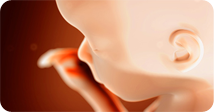
Baby's Growth and Development at 23 Weeks Pregnant
Much of your baby's development during the 23rd week of pregnancy focuses on preparing for her first real breath once she is born. Here’s what’s happening this week:
- Your baby weighs slightly more than a pound now, and she’s about the length of an ear of corn.
- Your baby's lungs develop rapidly this week as they prepare for birth.
- Her lungs are producing a substance called surfactant that allows the lungs to inflate and deflate without collapsing or sticking together.
- Blood vessels in your baby's lungs also are growing and developing in preparation for breathing.
- Your baby is making breathing-like movements for practice, moving amniotic fluid in and out of her lungs.
- Although your baby is getting all of the oxygen she needs from your placenta, this practice is important for developing her diaphragm muscles.
- By your 23rd week of pregnancy, your baby actually looks like a baby. She still has little body fat and still is trying to fill out her wrinkly skin.
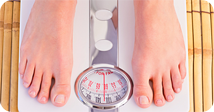
Your Changing Body at 23 Weeks Pregnant
While many developments are occurring within your body at 23 weeks pregnant, like many pregnant women, you might find yourself wondering about weight gain. This might be true as you see a consistent gain on the scale from week to week.
- By the 23rd week of pregnancy, most women are gaining an average of a pound a week. By the end of your pregnancy, you might have gained 25 pounds to 35 pounds, or more. See below to find out where that weight goes.
- Your doctor will discuss what's best for you individually.
- Back pain probably continues during your 23rd week of pregnancy as your stomach stretches and your joints continue to soften in preparation for childbirth. Your lower spine will probably continue to curve backward, allowing you to keep your balance while still supporting the weight of your growing baby.
- Increased vaginal discharge continues to be thin and white, which is normal. If you experience bleeding, or a change in discharge, contact your doctor.
- A bit off balance, even clumsy? Clumsiness is a normal part of pregnancy as your baby rapidly grows. Not only is your center of balance off at 23 weeks pregnant and beyond, but the hormones that are loosening joints and ligaments can make it difficult to be graceful. Try these tips:
- Take special care and do even normal activities more slowly.
- If you do fall and are concerned, alert your doctor. But remember that your baby is well protected within your uterus and inside a protective cushion of amniotic fluid.
Where's the Weight Going?
These are estimated weights. Every woman and baby is different.
| Baby |
6 1/2 to 9 pounds |
| Placenta |
1 1/2 pounds |
| Amniotic fluid |
2 pounds |
| Uterus |
2 pounds |
| Heavier breasts |
2 to 3 pounds |
| Additional blood volume |
3 to 4 pounds |
| Increased fluids |
3 to 4 pounds |
| Fat storage |
6 to 8 pounds |

Wellness and Nutrition at 23 Weeks Pregnant
A focus on wellness and nutrition continues during your 23rd week of pregnancy. Remember to continue eating regularly scheduled, balanced meals. This will help you keep your energy up.
- Activity doesn't have to mean formal exercise. Right now, while your body might be feeling its pregnancy best, try building a little more activity into your daily routine. Try these tips:
- Park your car further away from the entrance when you go to register at the baby store!
- Choose the steps instead of the elevator to take that file two floors up
- Look for opportunities to move more and sit less as you go about your daily routine.
- Wondering how best to buckle your growing belly? Whether it's around the corner or a long trip, the safest way for you and your baby to travel in the car always is with the seat belt fastened.
- To maximize safety and minimize discomfort, position the lower belt below your stomach, lying across your pelvis and upper thighs.
- Position the shoulder strap over your shoulder, diagonally between your breasts.
24th Week of Pregnancy
Upside Down or Right Side Up?
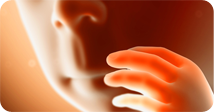
Baby's Growth and Development at 24 Weeks Pregnant
During your 24th week of pregnancy, your baby's face is almost completely formed, down to the tiny eyelashes.
- When you’re 24 weeks pregnant, your baby is about 8 inches long, close to the length of a banana, and weighs about 1½ pounds.
- Which way is up? Your baby probably knows — now that his inner ear, which controls balance, has finished developing. He might realize whether he is upside down or right side up inside your amniotic sac.
- Your baby probably is continuing to become more active.
- Your baby's movements show your doctor that your baby is in good health.
- His movements right now are important for stimulating muscle growth, keeping joints flexible and strengthening bones.
- Right now, your baby probably is gaining about 6 ounces each week.

Your Changing Body at 24 Weeks Pregnant
At this 24th week of pregnancy, you probably are continuing to feel fairly good. You might be learning to adjust to your growing abdomen and shifting center of balance.
- Your rib cage is continuing to expand to house your expanding lungs. After your baby is born, your rib cage will return to its normal size.
- Blood vessels in your breasts continue to become more visible.
- A shift in hormones at 24 weeks pregnant: As you progress through your pregnancy, various hormones are produced at different rates to meet the changing needs of your baby.
- In the first 20 weeks of pregnancy, your body produced more progesterone.
- At 21 to 22 weeks pregnant, your body produced equal amounts of progesterone and estrogen.
- Starting the 24th week of pregnancy, your body's amount of estrogen is higher.
- Because your urine flow probably remains slow at your 24th week of pregnancy with your growing uterus and hormone-relaxed muscles, you may want to continue to watch for a possible urinary infection. Call your doctor if you:
- Urinate more than usual
- Feel burning when you urinate
- Have a fever, abdominal pain, or severe backache
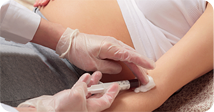
Wellness and Nutrition at 24 Weeks Pregnant
Still feeling good? This may be a great time to add variety to your regular exercise routine and eating habits.
- Eating out … and still eating healthy. Going out can be convenient, especially when you're pregnant and extremely busy. Consider these healthful tips when you go out to eat:
- Restaurant choices often hold many "hidden" calories, unhealthy fats, and sugars. Here are a few tips:
- Don't arrive famished. It’s the best way to ensure you overeat. Try to eat a piece of fruit, vegetables, crackers, or a handful of nuts before you go.
- Ask about ingredients or make special requests.You almost always can substitute grilled options for fried or steamed veggies for fries.
- Smaller is better. Plan to share a meal or immediately box half of it to bring home for another meal.
- At your next doctor's visit, you probably will take the glucose screening test. This test usually occurs between the 24th week of pregnancy and the 28th week, or earlier if you have risk factors.
- The test checks for gestational diabetes — a type of diabetes that some women experience during pregnancy and that goes away after baby is born.
- You will drink a full glass of glucose solution and your doctor will check your blood glucose level an hour later.
- If results are abnormal, your doctor may schedule you to take a glucose tolerance test, which is very similar, but is taken after you fast and requires four blood samples over three hours.
25th Week of Pregnancy
Focus on Self-Care

Baby's Growth and Development at 25 Weeks Pregnant
During the 25th week of pregnancy, your baby uses her tiny developing hands to learn about herself and her environment. Here’s what else is going on:
- This week, your baby weighs about a pound and a half, and is about the length of a small cantaloupe.
- Reach for the stars! When you’re 25 weeks pregnant, your baby’s hands are fully developed. She even can make a fist.
- The nerve connections in her hands continue to develop.
- She uses her hands to explore her environment.

Your Changing Body at 25 Weeks Pregnant
During the 25th week of pregnancy and in the weeks that follow, your body continues its evolution of change.
- Your uterus extends beyond your navel but below your chest.
- Around the 25th week of pregnancy, your blood pressure returns to your pre-pregnancy level.
- Your lung capacity increases. It’s normal to breathe faster or experience a little shortness of breath.
- In preparation for breastfeeding, at 25 weeks pregnant, the milk-producing glands in your breasts grow larger and the skin around your are olas and nipples changes.

Wellness and Nutrition at 25 Weeks Pregnant
During your 25th week of pregnancy, self-care remains a priority. Continue to seek relief from common pregnancy symptoms, such as back pain.
- If you are experiencing back pain during your 25th week of pregnancy, try a gentle stretching pose. It might help strengthen and stretch your back, pelvis, and thigh muscles.
- Kneel on your hands and knees. Your hands should be directly below your shoulders. Your knees should be about 10 inches apart.
- Slowly curl backward, bringing your head gently toward your knees and your bottom toward your feet. Your arms should be straight and extended, but not locked at the elbow.
- Hold for a count of about five.
- Slowly rise to your original kneeling position.
- Repeat several times.
- Nutrition tip: Are herbal supplements or remedies safe? Not all herbal supplements are regulated in Singapore, so it’s hard to know about proper dosing, healthy levels, and their safety to expectant moms and their unborn babies. Before taking any herbal supplement, speak with your doctor.
26th Week of Pregnancy
Relief Tips for Trimester Two
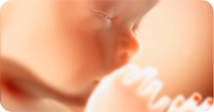
Baby's Growth and Development at 26 Weeks Pregnant
At 26 weeks pregnant, it’s exciting to think about what your baby looks like as his appearance becomes more refined:
- By the 26th week of pregnancy, your baby weighs 1½ to 2 pounds, and is about the length of a small pineapple.
- Your baby’s eyebrows and eyelashes are well formed.
- His eyes are fully developed — he will start to open and close them at around 28 weeks.
- The hair on his head grows and thickens.
- Little footprints and fingerprints form.
- He starts using his lungs to mimic breathing.
- Essential fats accumulate under his skin.
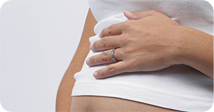
Your Changing Body at 26 Weeks Pregnant
During the 26th week of pregnancy and in the weeks that follow, you might face some side effects as a result of your changing body. These include heartburn, constipation, and hemorrhoids. Learn how pregnant women manage:
Heartburn or constipation may occur during your 26th week of pregnancy as a result of your expanding uterus and the impact of hormones on your digestive system. Try these tips for managing heartburn:
- Watch what you eat, but don't give up the balanced nutrition your body needs.
- Eat smaller, more frequent meals.
- Eat slowly.
- Avoid eating late at night and don't lie down for several hours after eating.
- Ask your doctor about antacids that are OK to take during pregnancy.
Try these techniques for relieving constipation:
- Eat fiber-rich foods
- Drink plenty of fluids — at least eight glasses a day.
- Don’t forget the old favorites: Fruits and juices, especially prunes, continue to be an effective remedy.
- Try smaller, more frequent meals.
- Add a little more activity to your exercise routine during your 26th week of pregnancy. Just an extra 10 minutes may offer the boost your system needs.
- Iron supplements can sometimes cause constipation. Try taking them with prune juice.
Pregnant women may get hemorrhoids
Hemorrhoids are essentially varicose veins in the rectal area. They occur when the uterus puts pressure on the veins in the pelvic area. Hemorrhoids can worsen with constipation. They often can be relieved by diet, exercise, and other comfort measures, such as:
- Eating a diet high in fiber
- Drinking lots of liquids
- Keeping weight gain in check
- Taking baths (that are n’t too hot or too long)
- Using ice packs to reduce swelling
- Moving around to relieve the weight of your uterus
- Talking with your doctor about a topical cream

Wellness and Nutrition at 26 Weeks Pregnant
At 26 weeks pregnant, you are well into your second trimester. At your next doctor’s visit, he or she will conduct routine tests. Plus, your doctor might examine your readiness for labor and delivery. During your 26th week of pregnancy, you also might want to talk to your doctor about traveling.
- At the doctor’s office. Your doctor will check your vitals as in previous visits. He or she also might do the following:
- Check the baby’s position in utero, which is likely to change throughout the rest of your pregnancy
- Prescribe a glucose test for gestational diabetes, a temporary form of diabetes that can occur during pregnancy
- Test for Rh antibodies, which can be treated during pregnancy
- Test for anemia caused by a lack of iron, which is treatable during pregnancy
- Consider taking a trip. With early pregnancy symptoms behind you and energy in your favor, traveling during your second trimester might be just the ticket. Check with your doctor to make sure it’s OK and consider these travel tips when you go!
- Plan a trip that will be comfortable and restful for you.
- Know the location of the closest health care facility, just in case.
- You may be feeling great, but take it slow.
Exercise Tip: Watch for Warning Signs
It's important to keep moving throughout your pregnancy. But, if you experience any of these symptoms, stop what you are doing. Speak with your doctor if symptoms are intense or do not subside.
- Chest pain
- Decreased fetal movements
- Difficulty walking
27th Week of Pregnancy
She Recognizes Your Voice
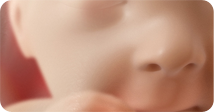
Baby's Growth and Development at 27 Weeks Pregnant
Your baby gets very active at 27 weeks pregnant. Discover the other changes she’s going through:
- At 27 weeks pregnant, your baby weighs almost 2 pounds, and is about the length of a head of broccoli.
- Her lungs, liver, and immune system keep maturing.
- She may know your voice and your partner’s voice.
- During the 27th week of pregnancy, your baby is as much as four times longer than she was during the 12th week of pregnancy.

Your Changing Body at 27 Weeks Pregnant
At 27 weeks pregnant, you’re nearing the end of your second trimester. Your body probably will start experiencing changes to help you get ready for childbirth:
- Your urine flow may be slow. Use the bathroom often and speak with your doctor if you are concerned about a urinary tract infection.
- You may continue to have a thin, white, odorless vaginal discharge. Talk to your doctor if it’s heavy, green, yellow, or strong-smelling. You may have a vaginal infection, which can be treated during pregnancy.
- Braxton-Hicks contractions (false labor) continue.
- Ligaments in your pelvic area soften to get ready for delivery.
- You may experience back pain.

Wellness and Nutrition at 27 Weeks Pregnant
At 27 weeks pregnant, you are nearly finished with your second trimester. Exercise and nutrition are still a really important part of your routine, now and through the rest of your pregnancy. Now’s also a great time to learn the signs of preterm labor.
Preterm labor is when contractions start before the 37th week of pregnancy. Some signs of preterm labor include:
- Contractions that feel different than Braxton Hicks
- Contractions that occur at regular intervals, that are consistent, or that become more intense
- Contractions with lower back pain, cramps, or other pain
- Changes in your vaginal discharge that include spotting or bleeding
- Water from your vagina
If you experience symptoms of preterm labor, call your doctor.
Wellness Tip
Make exercise fun and social. By now, you’ve probably met many other pregnant women at the gym, at childbirth classes, and at work. Consider meeting with other expectant moms for a walk.
28th Week of Pregnancy
Pack Some Power Into Your Snack
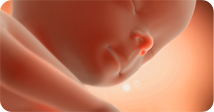
Baby's Growth and Development at 28 Weeks Pregnant
During the 28th week of pregnancy, your baby wants to see what’s going on in his environment.
- Your baby is about 10 inches long — roughly the length of an average zucchini. She weighs about 2 pounds.
- His brain develops and expands.
- Your baby may open his eyes in utero.
- More fat accumulates under his skin.
- He continues to take 20- to 30-minute naps with some routine.
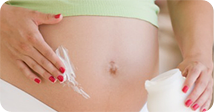
Your Changing Body at 28 Weeks Pregnant
At 28 weeks pregnant (and throughout this month of your pregnancy), your weight should go up and your skin probably will keep changing.
- You should be gaining about a pound a week. Learn more about where the weight goes.
- Stretch marks: As your skin expands during pregnancy, stretch marks can appear on your skin. These red, pink, or purplish streaks may appear on your stomach, breasts, arms, hips, thighs, or rear. Stretch marks are not a sign that you're gaining too much weight — they can appear on the slimmest of pregnant women! You could try a cream specifically made for stretch marks.
- Thank the family tree. Whether you get stretch marks has more to do with heredity than any other factor. After you deliver, your stretch marks probably will fade to light pink or white, but may not completely disappear.
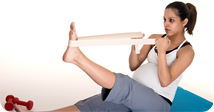
Wellness and Nutrition at 28 Weeks Pregnant
Congratulations! At 28 weeks pregnant, you’ve completed the second trimester of your pregnancy. Here’s how you can take care of yourself — and your body.
- Easy does it. Make safety your top priority when you exercise by following these tips:
- Stretch and warm up for at least five minutes before starting to exercise.
- Start your activity at an easy, slow pace. Gingerly increase your speed and repetitions to a level that’s comfortable for you.
- Drink fluid.
- Work out on a flat, firm surface.
- Rise slowly after doing floor exercises.
- Cool down for five to 10 minutes.
- Wear supportive shoes and a supportive bra.
- Pack some power into your snack. For variety, try these nutrient- and energy-rich snack options:
- Fresh & dried fruit
- Salad
- Steamed buns
- Soybean
- Soupy noodle
- Sandwiches
- Nuts
















































